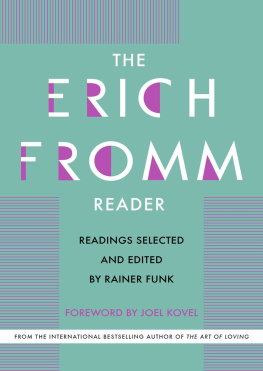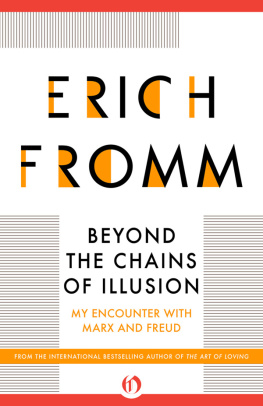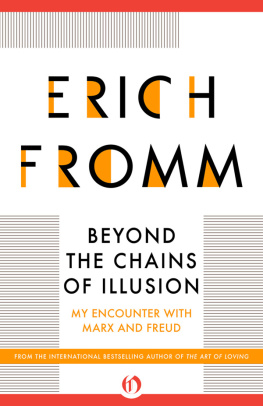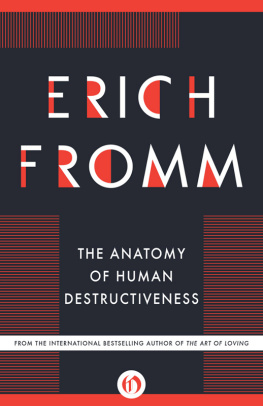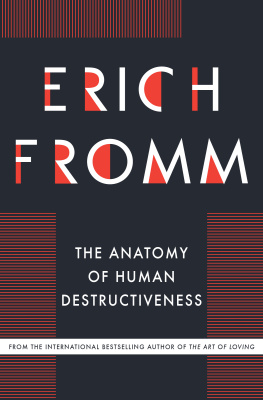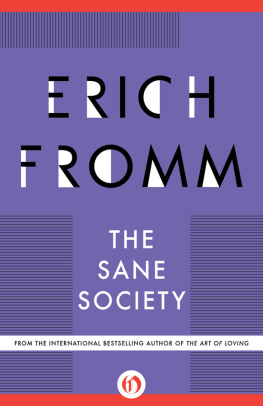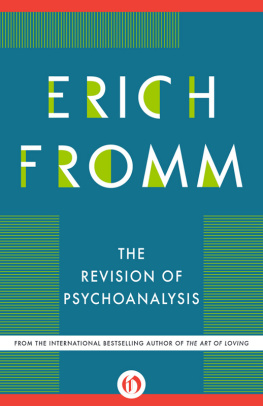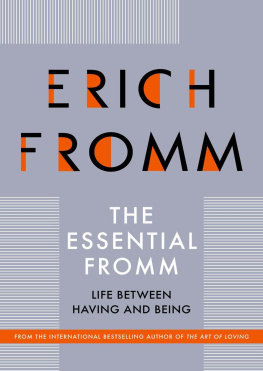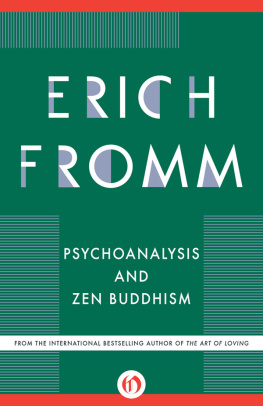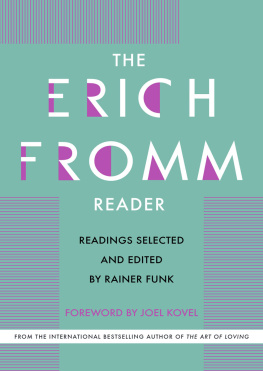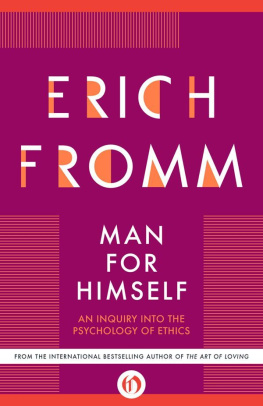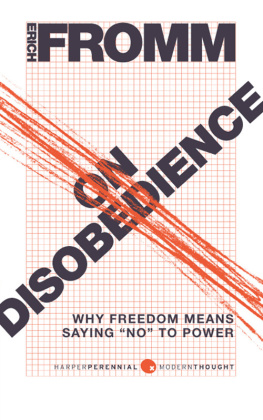Erich Fromm - The Erich Fromm Reader: Readings Selected and Edited by Rainer Funk
Here you can read online Erich Fromm - The Erich Fromm Reader: Readings Selected and Edited by Rainer Funk full text of the book (entire story) in english for free. Download pdf and epub, get meaning, cover and reviews about this ebook. City: New York, year: 2014, publisher: Open Road Distribution, genre: Science. Description of the work, (preface) as well as reviews are available. Best literature library LitArk.com created for fans of good reading and offers a wide selection of genres:
Romance novel
Science fiction
Adventure
Detective
Science
History
Home and family
Prose
Art
Politics
Computer
Non-fiction
Religion
Business
Children
Humor
Choose a favorite category and find really read worthwhile books. Enjoy immersion in the world of imagination, feel the emotions of the characters or learn something new for yourself, make an fascinating discovery.
- Book:The Erich Fromm Reader: Readings Selected and Edited by Rainer Funk
- Author:
- Publisher:Open Road Distribution
- Genre:
- Year:2014
- City:New York
- Rating:5 / 5
- Favourites:Add to favourites
- Your mark:
- 100
- 1
- 2
- 3
- 4
- 5
The Erich Fromm Reader: Readings Selected and Edited by Rainer Funk: summary, description and annotation
We offer to read an annotation, description, summary or preface (depends on what the author of the book "The Erich Fromm Reader: Readings Selected and Edited by Rainer Funk" wrote himself). If you haven't found the necessary information about the book — write in the comments, we will try to find it.
The Erich Fromm Reader: Readings Selected and Edited by Rainer Funk — read online for free the complete book (whole text) full work
Below is the text of the book, divided by pages. System saving the place of the last page read, allows you to conveniently read the book "The Erich Fromm Reader: Readings Selected and Edited by Rainer Funk" online for free, without having to search again every time where you left off. Put a bookmark, and you can go to the page where you finished reading at any time.
Font size:
Interval:
Bookmark:
The Erich Fromm Reader
Edited and with an introduction by Rainer Funk
Contents
Introduction by Rainer Funk
An Erich Fromm reader has its own special appeal, and this one has a particular purpose. Erich Fromm is familiar to many as the author of The Art of Loving and To Have or To Be? but his writings on social psychology, social theory, and religion are much less well known. The main goal of this collection is to introduce the other, unknown Fromm to a wider audience. A second goal is to make readers aware of how important these texts are to his thinking, often more so than the best-sellers. Fromm himself was firmly opposed to an approach that would mine his collected writings for nuggets and present them out of context. In compiling this volume, I have taken great care to avoid the simplification or distortion of his ideas as much as possible. Each of the twenty selections is a single connected passage on a central theme in Fromms thinking. Most of them are concise statements of his insights, ideas, and convictions, but they by no means exhaust the supply of significant texts on each topic.
This collection covers a variety of themes. Many people may be surprised at the breadth of Fromms interests and the number of subjects on which he wrote. It is my hope that once readers have been introduced to them, they will be stimulated to search out other works.
The selection and arrangement of the texts included in this volume are based on a particular conception. Anyone who attempts to understand Fromms thinking in its own terms without assigning him over hastily to a particular school will discover a strand of inner logic connecting the many themes in his work. This logic allows us to comprehend why Fromm, a psychoanalyst and social psychologist, also felt compelled to take stands on political, religious, ethical, philosophical, and social questions. One must first grasp Fromms psychoanalytic and psychological premises, however, to be able to recognize this logical thread. For this reason, the volume begins with the texts on the methods of social psychology and Fromms theory of character; the other selections build on this groundwork.
Each section is preceded by a short introduction in which I have tried to place the passages in a thematic, biographical, and bibliographical context. I provide titles for the various sections and passages, partly to indicate that some of the selections have been slightly edited and abridged. [xvi] Omissions from the original are always marked, however, by []. A few footnotes in the original have been retained; the rest have been either incorporated into the main text or omitted.
Above all, it is my hope that this volume will succeed in acquainting readers with Fromm as the founder of a humanistic science of humankind and in inspiring them to reflect on and practice his ideas.
PART I
Studying the Social Unconscious
The question of what connects people to one another and what permits them to think, feel, and act jointly is the most important and the most personal scholarly question that Erich Fromm posed. He first formulated it in sociological terms for his dissertation as a student at the University of Heidelberg. Raised in an Orthodox Jewish family in Frankfurt, Fromm decided to investigate the social glue that had held Jews together in the Diaspora. He found the answer in the ethos of the Jewish law.
At about the same time, in the years 1923-24, Frieda Reichmann (who later became Fromms first wife) introduced him to another new branch of science that could offer useful approaches to answering the same question: psychoanalysis as developed by Sigmund Freud. Fromm applied it to inquire into the unconscious forces at work in the minds of human beings not only as individuals but also as social beings. To Fromm, understanding individuals as social creatures meant investigating the social aspect of the unconscious. This was his decisive contribution to psychoanalytic thinking. He combined psychoanalysis and sociology to create an analytic social psychology, which views human beings simultaneously in terms of both their particular social identity and their unconscious determination.
Analytic social psychology does more than permit one to understand the psychic structure of individuals as social beings, however. It allows one to investigate the unconscious of social entities, for social entities consist of individuals who form a society or group because they share an outlook or attitudes. Here Fromm takes the concept of dynamic character as developed by Freud and applies it to social entities. He studies the psychic structure of a society by trying to grasp the societys character as an ideal type. The idea of investigating the social unconscious with the aid of the social character is Fromms most important contribution to the field of psychology. It also determined Fromms other interests. Unless one grasps that Fromm approached all other questions from his dominant interest in analytic social psychology, it is difficult to understand his thinking. Whether he is speaking of love, of society, or of being as an alternative to having, Fromm always approaches his topic from the perspective of analytic social psychology.
The Approach to a Psychoanalytic Social Psychology
It is one of the essential accomplishments of psychoanalysis that it has done away with the false distinction between social psychology and individual psychology. On the one hand, Freud emphasized that there is no individual psychology of man isolated from his social environment, because an isolated man does not exist. Freud knew no homo psychologies, no psychological Robinson Crusoe, like the economic man of classical economic theory. On the contrary, one of Freuds most important discoveries was the understanding of the psychological development of the individuals earliest social relationsthose with his parents, brothers, and sisters. It is true, Freud wrote,
that individual psychology is concerned with the individual man and explores the paths by which he seeks to find satisfaction for his instinctual impulses; but only rarely and under certain exceptional conditions is individual psychology in a position to disregard the relations of this individual to others. In the individuals mental life someone else is invariably involved, as a model, as an object, as a helper, as an opponent; and so from the very first individual psychology, in this extended but entirely justifiable sense of the words, is at the same time social psychology as well.
On the other hand, Freud broke radically with the illusion of a social psychology whose object was the group. For him, social instinct was not the object of psychology any more than isolated man was, since it was not an original and elemental instinct; rather, he saw the beginning of the psyches formation in a narrower circle, such as the family. He has shown that the psychological phenomena operative in the group are to be understood on the basis of the psychic mechanisms operative in the individual, not on the basis of a group mind as such.
The difference between individual and social psychology is revealed to be a quantitative and not a qualitative one. Individual psychology takes into account all determinants that have affected the lot of the individual, and in this way arrives at a maximally complete picture of the individuals psychic structure. The more we extend the sphere of psychological investigationthat is, the greater the number of men whose common traits permit them to be groupedthe more we must reduce the extent of our examination of the total psychic structure of the individual members of the group.
The greater, therefore, the number of subjects of an investigation in social psychology, the narrower the insight into the total psychic structure of any individual within the group being studied. If this is not recognized, misunderstandings will easily arise in the evaluation of the results of such investigations. One expects to hear something about the psychic structure of the individual member of a group, but the social-psychological investigation can study only the character matrix common to all members of the group and does not take into account the total character structure of a particular individual. The latter can never be the task of social psychology and is possible only if an extensive knowledge of the individuals development is available. If, for example, in a social-psychological investigation it is asserted that a group changes from an aggressive-hostile attitude toward the father figure to a passive-submissive attitude, this assertion means something different from the same statement when made of an individual in an individual-psychological investigation. In the latter case, it means that this change is true of the individuals total attitude; in the former, it means that it represents an average characteristic common to all the members of the group, which does not necessarily play a central role in the character structure of each individual. The value of social-psychological investigation, therefore, cannot lie in the fact that we acquire from it a full insight into the psychic peculiarities of the individual members, but only in the fact that we can establish those common psychic tendencies that play a decisive role in their social development.
Next pageFont size:
Interval:
Bookmark:
Similar books «The Erich Fromm Reader: Readings Selected and Edited by Rainer Funk»
Look at similar books to The Erich Fromm Reader: Readings Selected and Edited by Rainer Funk. We have selected literature similar in name and meaning in the hope of providing readers with more options to find new, interesting, not yet read works.
Discussion, reviews of the book The Erich Fromm Reader: Readings Selected and Edited by Rainer Funk and just readers' own opinions. Leave your comments, write what you think about the work, its meaning or the main characters. Specify what exactly you liked and what you didn't like, and why you think so.

